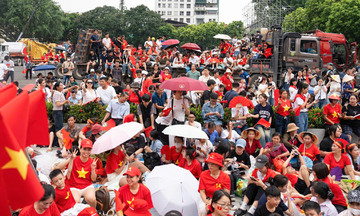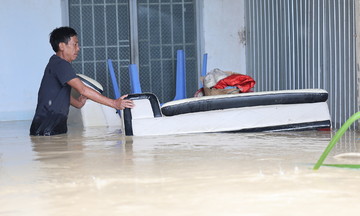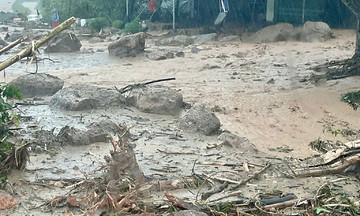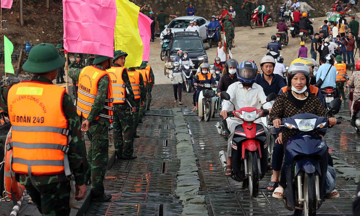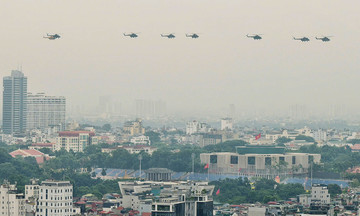On 10/7, the Hanoi People's Council passed a resolution outlining measures to reduce plastic waste in production, business, services, and daily life within the city. The resolution sets a roadmap for phasing out the production, import, and use of single-use plastic products (except those certified with the Vietnam eco-label), non-biodegradable plastic packaging (including non-biodegradable nylon bags and styrofoam food containers), and products containing microplastics.
For businesses and services, Hanoi stipulates that from 1/1/2026, hotels and tourist areas will no longer circulate or use single-use plastic products. These include toothbrushes, razors, cotton swabs, shower caps, and single-use plastic packaging for toothpaste, shower gel, body lotion, shampoo, and conditioner.
Markets and convenience stores will stop providing free non-biodegradable nylon bags from 1/1/2027. By 1/1/2028, they will no longer circulate or use single-use plastic products and non-biodegradable plastic packaging (including non-biodegradable nylon bags and styrofoam food containers), except for products with non-biodegradable plastic packaging.
In daily life, city government agencies, units, organizations, and associations will cease using single-use plastic products and non-biodegradable plastic packaging from 1/1/2028.
For manufacturing activities, businesses using PE and PP plastics in packaging must use at least 20% recycled plastic from 1/1/2028, increasing to at least 30% after two years.
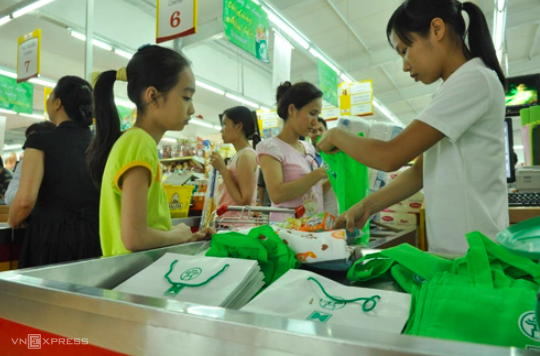 |
Environmentally friendly bags (white paper or blue fabric) are distributed free of charge at a supermarket system in the capital. Photo: Quang Xuan |
Environmentally friendly bags (white paper or blue fabric) are distributed free of charge at a supermarket system in the capital. Photo: Quang Xuan
Businesses must gradually reduce the production and import of single-use plastic products, non-biodegradable plastic packaging, and products containing microplastics. From 1/1/2031, businesses will stop producing and importing these items, except for export production.
Hanoi encourages agencies, organizations, and individuals to reduce plastic waste ahead of the issued roadmap. Those adopting best available techniques for plastic waste recycling will receive support and incentives according to city and central government policies.
According to the Hanoi People's Committee's report, the city generates over 1,400 tons of plastic waste per day, over 60% of which is single-use plastics and nylon bags. A 2021 survey of 48 supermarkets in Hanoi revealed that over 100,000 nylon bags are given out free daily, equivalent to 38 million bags a year. Most of these are used only once and end up in landfills.
Given this situation, to strengthen management and reduce plastic waste, and to implement point D, clause 2, Article 28 of the Capital Law (which stipulates measures to reduce plastic waste in production, business, services, and daily life), the city considers it "essential and compliant with regulations" to issue specific measures for Hanoi.
At a workshop on the National Plastic Action Partnership (NPAP) program on 9/7, a representative from KPMG, citing a World Bank report, said Vietnam is consistently among the top 10 countries for plastic waste leakage. In 2018, Vietnam emitted an estimated 3.7 million tons of plastic waste, a figure projected to reach 7.6 million tons by 2030. Only 0.4 million tons of this is recycled, while most is burned, dumped, or buried.
Plastic waste pollutes land, water, air, and the sea. This allows microplastics to enter the human body through water, air, or seafood, causing cell damage, inflammation, digestive disorders, allergies, and impaired liver and kidney function, according to the World Wide Fund for Nature (WWF - Vietnam). Plastic pollution also impacts tourism by damaging scenery and reducing visitor numbers.
Vo Hai








